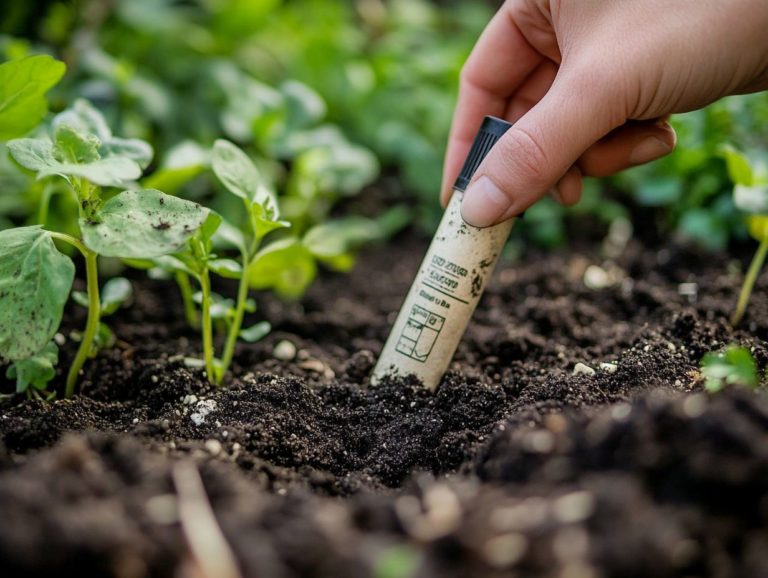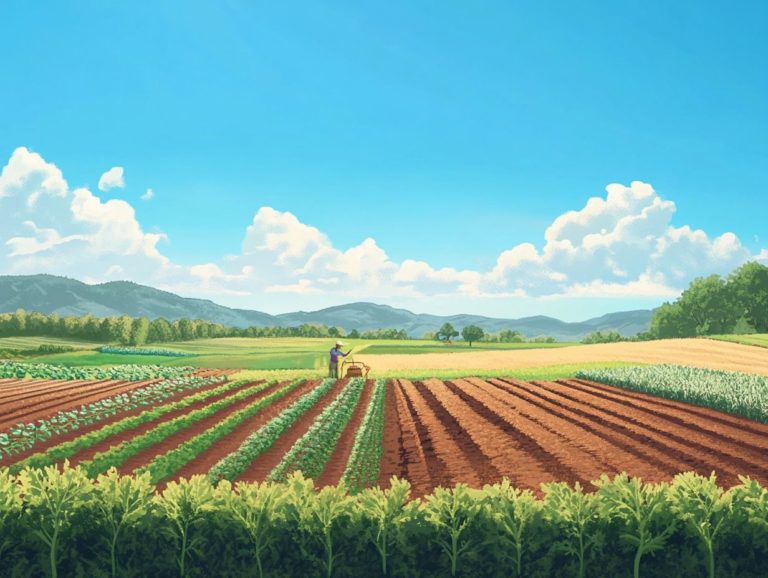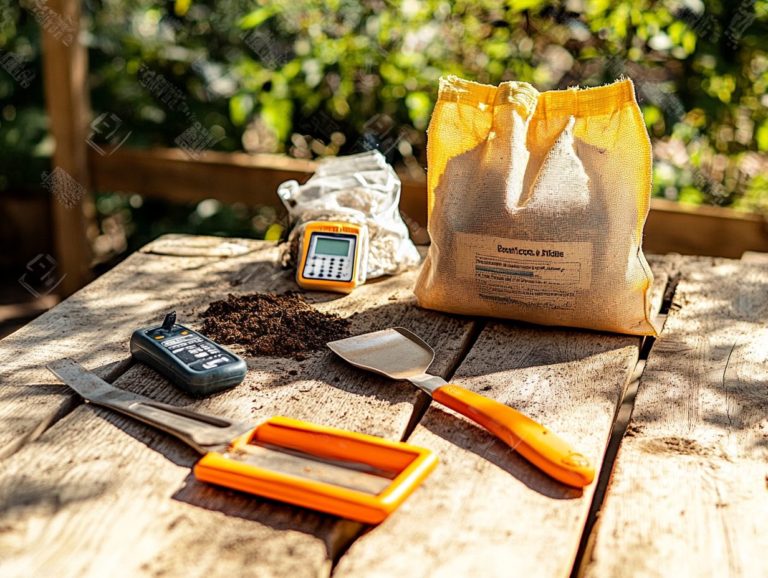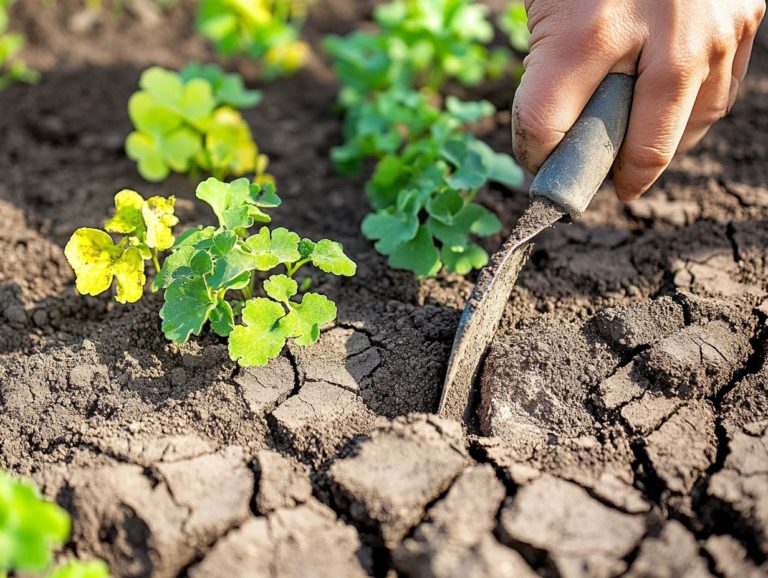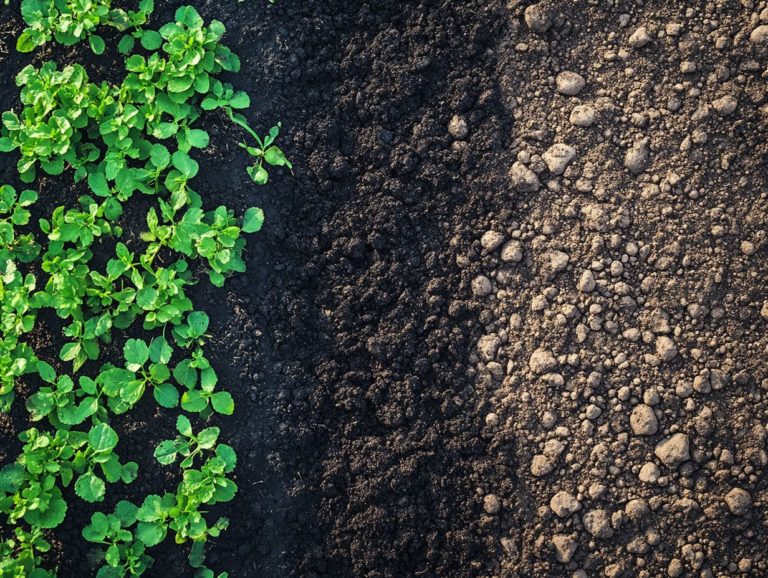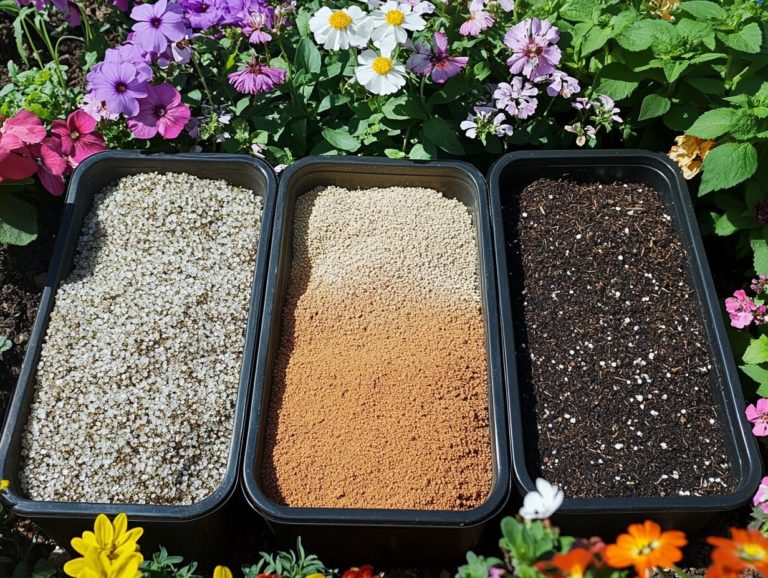5 Ways to Reduce Soil Pollution
Soil pollution is a critical issue affecting both the environment and human health. It often flies under the radar, but its impact is significant.
Contaminants infiltrate the ground, jeopardizing food safety and disrupting biodiversity. Entire ecosystems are at risk.
Proactive measures can tackle this challenge! Here are five effective strategies to mitigate soil pollution.
From sustainable agriculture to raising awareness, individuals and communities can play a vital role in cultivating a healthier planet.
Contents
- Key Takeaways:
- 1. Implement Sustainable Agriculture Practices
- 2. Proper Disposal of Chemicals and Pesticides
- 3. Encourage Composting and Natural Fertilizers
- 4. Promote Afforestation and Reforestation
- 5. Educate and Raise Awareness
- What Is Soil Pollution and Why Is It a Concern?
- Frequently Asked Questions
- 1. What are 5 ways to reduce soil pollution?
- 2. How can reducing the use of chemical fertilizers and pesticides help to reduce soil pollution?
- 3. What are some sustainable farming methods that can help to reduce soil pollution?
- 4. Why is proper disposal of hazardous waste important in reducing soil pollution?
- 5. How can composting and organic gardening practices contribute to reducing soil pollution?
- 6. What role do strict regulations on industrial waste management play in reducing soil pollution?
Key Takeaways:
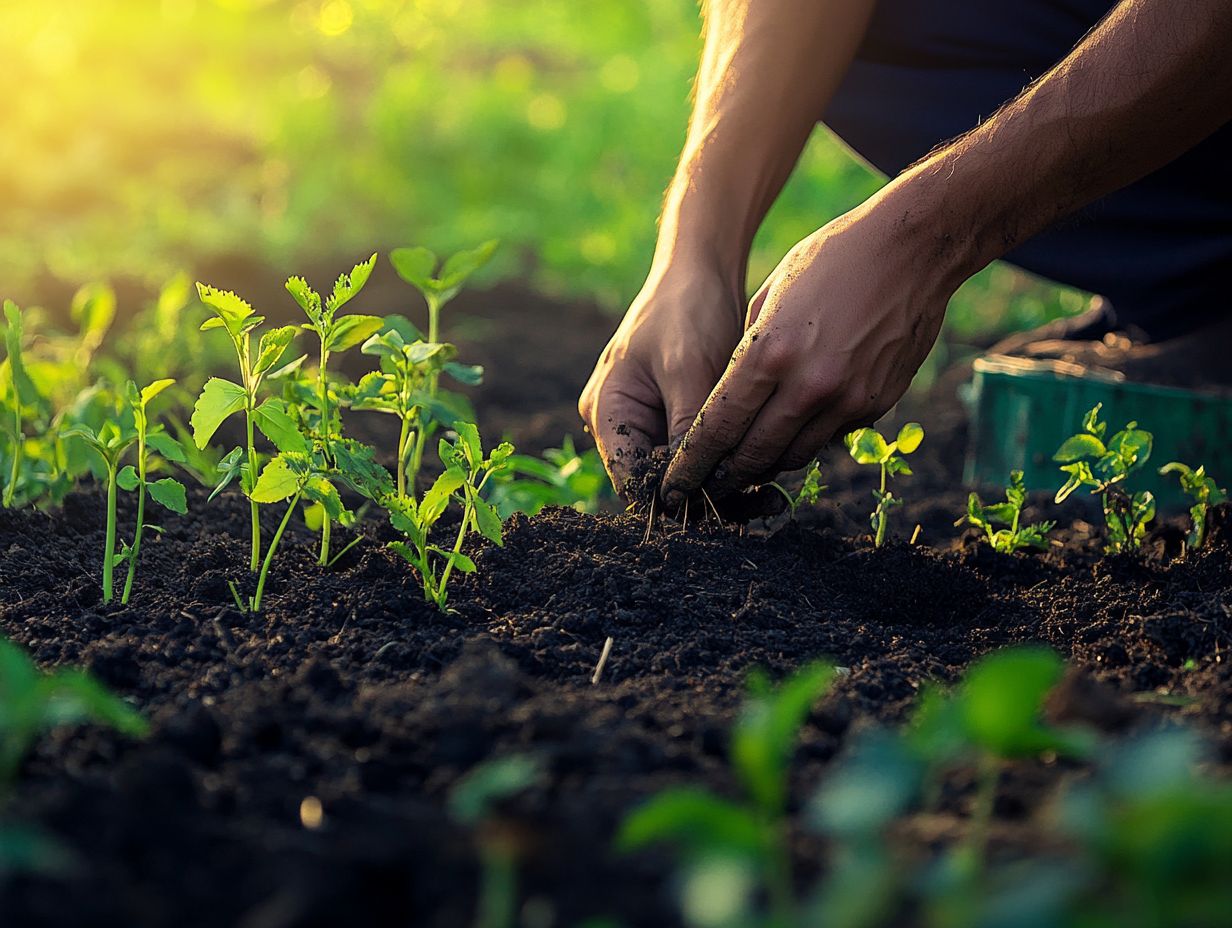
- Implement sustainable agriculture practices to reduce soil pollution and promote a healthier ecosystem.
- Dispose of chemicals and pesticides properly to prevent soil and water contamination.
- Encourage composting and use natural fertilizers to improve soil quality and reduce reliance on harmful chemicals.
1. Implement Sustainable Agriculture Practices
Using sustainable agriculture practices is crucial for fighting soil pollution. It also enhances soil fertility, ensuring long-term ecosystem health.
Farmers in Quebec are embracing eco-friendly methods that prioritize soil conservation. These practices reduce the reliance on chemical fertilizers and pesticides.
Techniques like crop rotation and organic farming are key. Crop rotation disrupts pest cycles and improves soil structure.
Organic farming avoids synthetic inputs, fostering a diverse array of microorganisms essential for soil health. Minimal tillage protects the soil and maintains moisture levels.
Across Quebec, farmers enjoy the benefits of healthier soil, increased yields, and a balanced ecosystem. This clearly demonstrates the effectiveness of sustainable practices.
2. Proper Disposal of Chemicals and Pesticides
Proper disposal of chemicals and pesticides is essential to prevent hazardous waste from contaminating soil and groundwater. This poses serious risks to human health and the environment.
Stringent regulations can help mitigate the effects of pesticide use. They ensure safe disposal practices.
Such regulations guide industries towards modern technologies like natural cleanup processes and incineration. Responsible waste management reduces the risk of toxic exposure.
Local initiatives encourage awareness and invite individuals to participate in chemical collection events. These efforts foster a culture of sustainability.
3. Encourage Composting and Natural Fertilizers
Encouraging composting and using natural fertilizers is essential for enhancing soil fertility and reducing reliance on chemical fertilizers. These chemicals often lead to soil degradation and pollution. Engaging your community in composting initiatives not only improves soil quality but also fosters a deeper awareness of sustainable practices.
By promoting compost use, you significantly boost the nutrient cycling process, contributing to enriched, vibrant soil that thrives with diverse plant life. Effective composting techniques like layering green and brown materials and ensuring proper aeration accelerate decomposition and maximize nutrient availability.
Successful community programs show that when individuals unite to share resources and knowledge, their collective impact can be transformative. This leads to healthier ecosystems and significantly less waste in landfills. By adopting composting and natural fertilizers, you pave the way for a more resilient environment, ensuring future generations inherit rich, productive soil.
4. Promote Afforestation and Reforestation
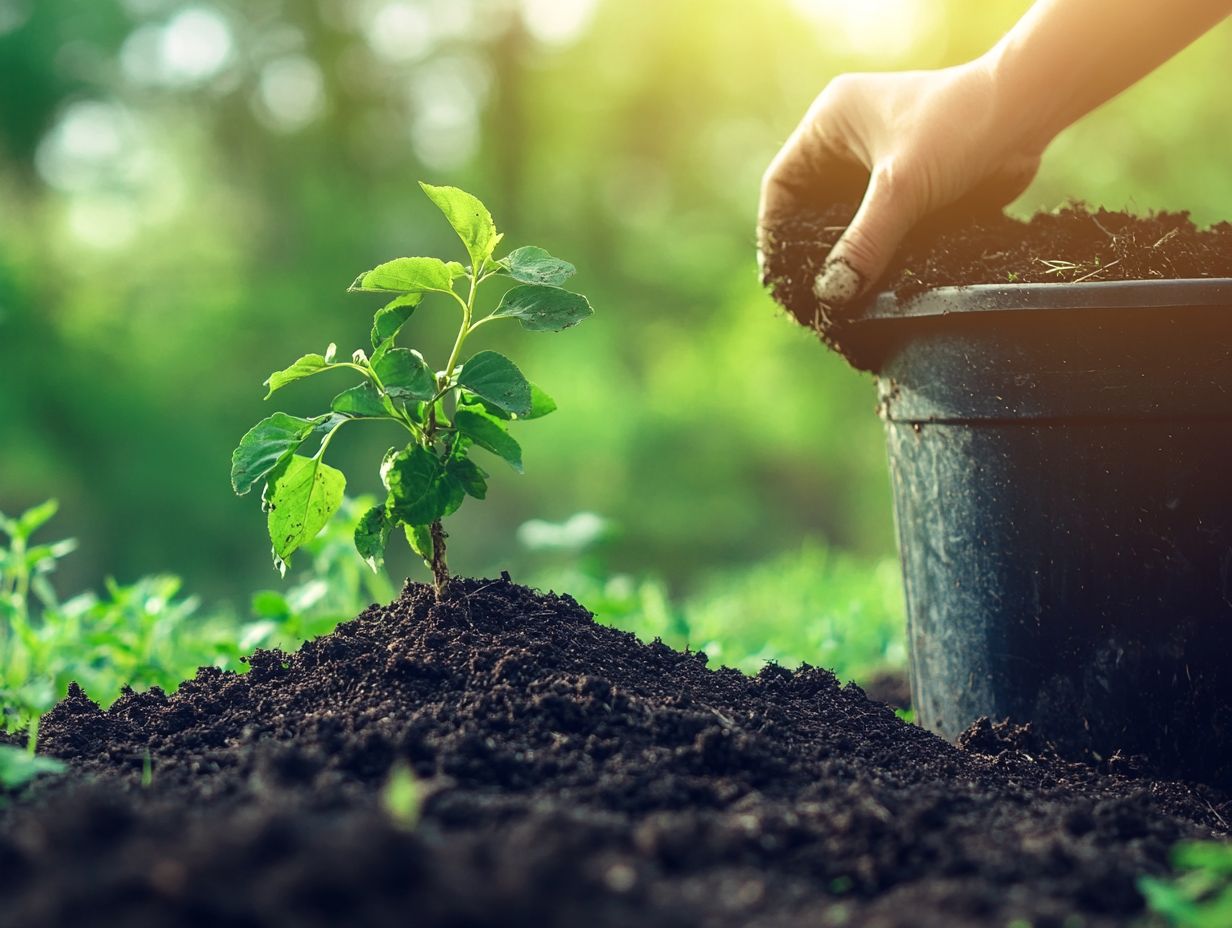
Promoting afforestation and reforestation initiatives is crucial for restoring ecosystem health and tackling climate change. These efforts also address challenges like soil erosion and degradation. By engaging in these practices, you help improve soil quality, enhance biodiversity, and create vital habitats for wildlife, leading to a more balanced ecological environment.
These efforts strengthen ecosystems and aid in carbon sequestration, which captures and stores carbon dioxide from the atmosphere. For instance, the Great Green Wall project in Africa has successfully planted millions of trees across the Sahel region. This initiative improves soil conditions, uplifts local communities, and provides crucial habitats for various species.
Community-led reforestation programs in Costa Rica have achieved remarkable success, increasing wildlife populations by 30% and improving air quality. By supporting these initiatives, you contribute to fostering a healthier planet, creating benefits that resonate with both current and future generations.
5. Educate and Raise Awareness
Educating yourself and raising awareness about soil pollution and its effects on human health and the environment is vital for fostering community engagement and promoting sustainable practices. Through comprehensive educational programs, you can gain a deeper understanding of the dangers posed by contaminated soil and the importance of adhering to environmental regulations, including the need for soil testing.
These initiatives highlight specific health issues linked to soil contamination like respiratory diseases and gastrointestinal disorders and provide actionable steps to mitigate these risks. By emphasizing the vital role of healthy soil in food production, these programs empower you to adopt organic farming techniques and advocate for improved waste management policies, addressing risks associated with industrial activities.
Engaging in hands-on workshops and community-driven projects can effectively involve local populations, motivating you to participate in soil conservation efforts and improve community awareness. Collaborative activities, such as tree planting and creating community gardens, cultivate a sense of stewardship over your environment, leading to more sustainable outcomes for both health and ecological well-being, while addressing the challenges of urbanization.
What Is Soil Pollution and Why Is It a Concern?
Soil pollution refers to the decline in soil health due to toxic substances, contaminants, and hazardous wastes. This presents serious concerns for both health and the environment, especially considering the rising threats from industrial activities.
When soil becomes contaminated, it can lead to reduced agricultural productivity and groundwater contamination, affecting communities that rely on this vital resource. One significant contributor to this urgent problem is the excessive use of chemical fertilizers and pesticides in modern agriculture.
These substances not only harm soil health but also leach into nearby water sources, creating a cascade of complications. Industrial activities also worsen the problem by releasing heavy metals and toxic compounds into the ground, further contributing to landfills.
The repercussions are extensive; studies indicate that in areas with high soil pollution, crop yields can plummet by as much as 30%. Communities living near contaminated sites face increased rates of respiratory diseases, neurological disorders, and even cancer.
We must act quickly to implement effective clean-up plans and stringent regulations to protect both health and the environment.
How Does Soil Pollution Affect the Environment and Human Health?
Soil pollution poses a significant threat to both the environment and human health. It disrupts the food chain and introduces harmful contaminants like heavy metals into ecosystems.
This contamination undermines soil fertility and jeopardizes groundwater quality, leading to serious health implications for those who rely on affected water sources. Harmful substances can contaminate our food as pollutants infiltrate the soil and are absorbed by plants.
As organisms consume these contaminated plants, toxins accumulate in their bodies, amplifying the risks faced by higher trophic levels, which are species that eat those plants. Health issues, such as respiratory problems, developmental delays in children, and various cancers, can arise from consuming contaminated food and water.
To combat this, implementing stricter regulations, supporting eco-friendly farming methods, and actively remediating polluted sites are essential steps for protecting both the environment and public health.
What Are the Major Causes of Soil Pollution?
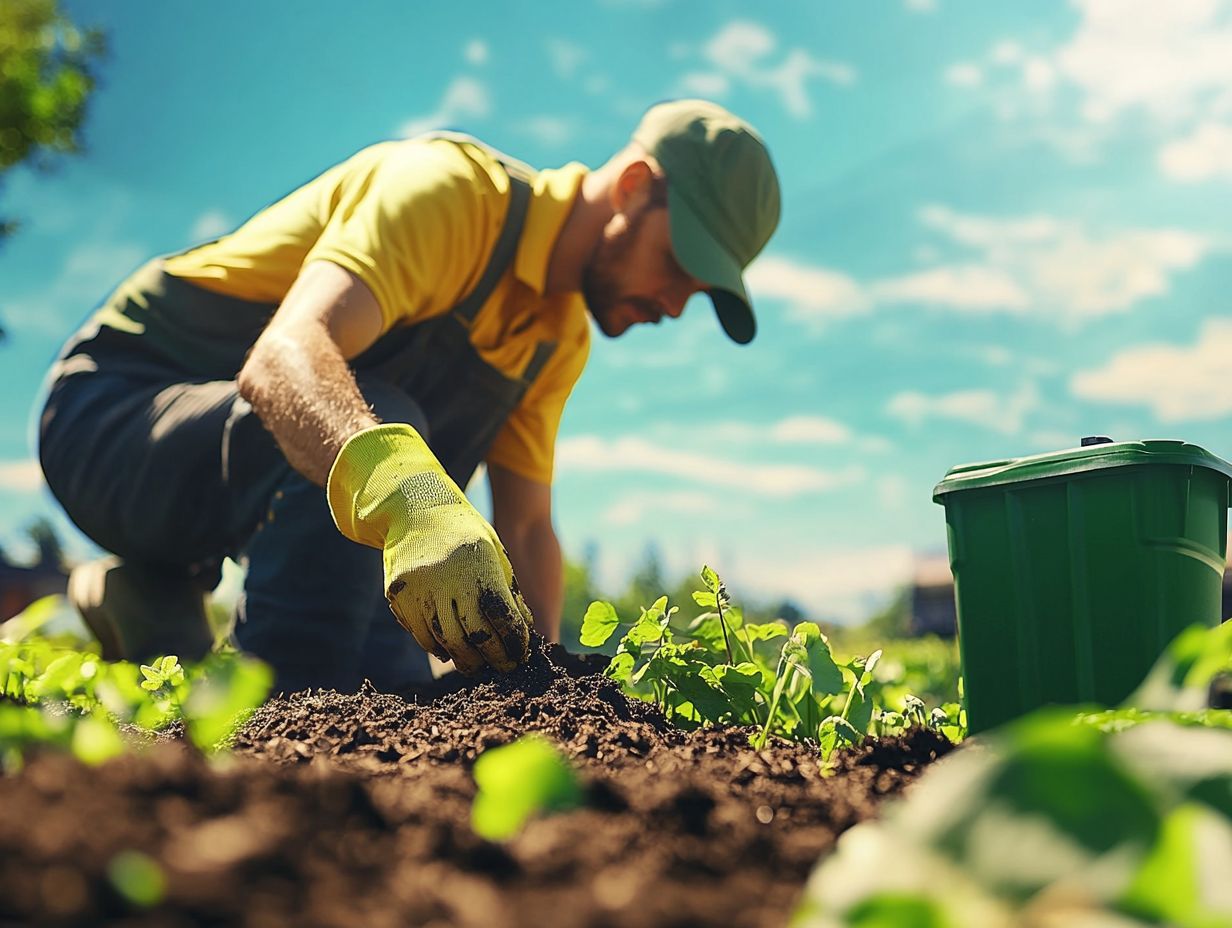
Major causes of soil pollution in your surroundings include industrial activities, improper landfill management, urbanization, and the excessive use of pesticides and chemical fertilizers. These practices not only contaminate the soil but also compromise its quality, resulting in detrimental effects on agriculture and ecosystem health.
In various regions, industries such as mining and manufacturing play a significant role by releasing heavy metals and toxic waste into the ground. Poorly managed landfills leach harmful substances that infiltrate the surrounding soil and water, creating a ripple effect of contamination.
Urban development often leads to soil compaction and erosion, diminishing the land s natural capacity to support crops. Additionally, the overapplication of fertilizers and pesticides in agriculture results in chemical runoff that disrupts local ecosystems.
To tackle these pressing issues, you can adopt sustainable agricultural practices, improve waste management systems, and advocate for regulations that limit harmful industrial emissions. By addressing these factors, communities can move towards healthier soil and a more balanced environment.
Join us in protecting our soil and health!
What Are the Benefits of Reducing Soil Pollution?
Reducing soil pollution brings many benefits, including enhanced ecosystem health and improved soil fertility.
Investing in cleaning up soil and embracing eco-friendly agricultural methods helps create a resilient environment for both human and wildlife populations.
These efforts pave the way for a rich, nutritious food supply that benefits everyone! They also promote biodiversity by creating habitats conducive to various flora and fauna.
Techniques like phytoremediation, bioremediation, and soil amendments can effectively restore contaminated sites, purifying the soil while enriching its nutrient content.
Healthier soil means reduced erosion and better water retention, ultimately protecting local water sources.
As you and your community adopt these sustainable practices, you will lessen the impacts of pollution and elevate the overall quality of life for everyone, paving the way for a vibrant and thriving future.
How Can Governments and Individuals Work Together to Reduce Soil Pollution?
You have a crucial role in the collaborative effort between governments and individuals to combat soil pollution.
By embracing pollution prevention strategies and advocating for strong environmental regulations, you can help create a significant positive impact on soil health.
To achieve this, support authorities as they implement stricter regulations on industrial waste disposal. Seek out educational resources that promote eco-friendly practices for farmers and local businesses.
Your involvement in community clean-up initiatives can be transformative. Adopting organic gardening techniques not only reduces soil contamination but also enhances biodiversity.
You can also champion policies that endorse sustainable land management and push for funding dedicated to rehabilitating polluted areas.
By doing so, you contribute to a unified effort that seeks to restore and protect invaluable soil ecosystems.
What Are Some Other Ways to Reduce Soil Pollution?
You have a range of powerful strategies at your disposal to reduce soil pollution, including bioremediation, conservation efforts, and the embrace of organic farming practices.
These methods not only cleanse contaminated soil but also foster healthier ecosystems and sustainable agricultural practices.
Consider utilizing phytoremediation, a technique where specific plants are cultivated to absorb contaminants.
For example, mustard plants are adept at extracting heavy metals like lead and cadmium from the soil, positioning them as invaluable allies in restoration projects.
Implementing zero-tillage farming can dramatically curb erosion and soil degradation, allowing natural regeneration processes to thrive.
Another promising method involves the application of biochar, which enhances soil organic matter while improving water retention and nutrient availability.
Together, these initiatives play a crucial role in restoring soil quality and revitalizing the environment, highlighting the multifaceted nature of soil remediation efforts.
Frequently Asked Questions
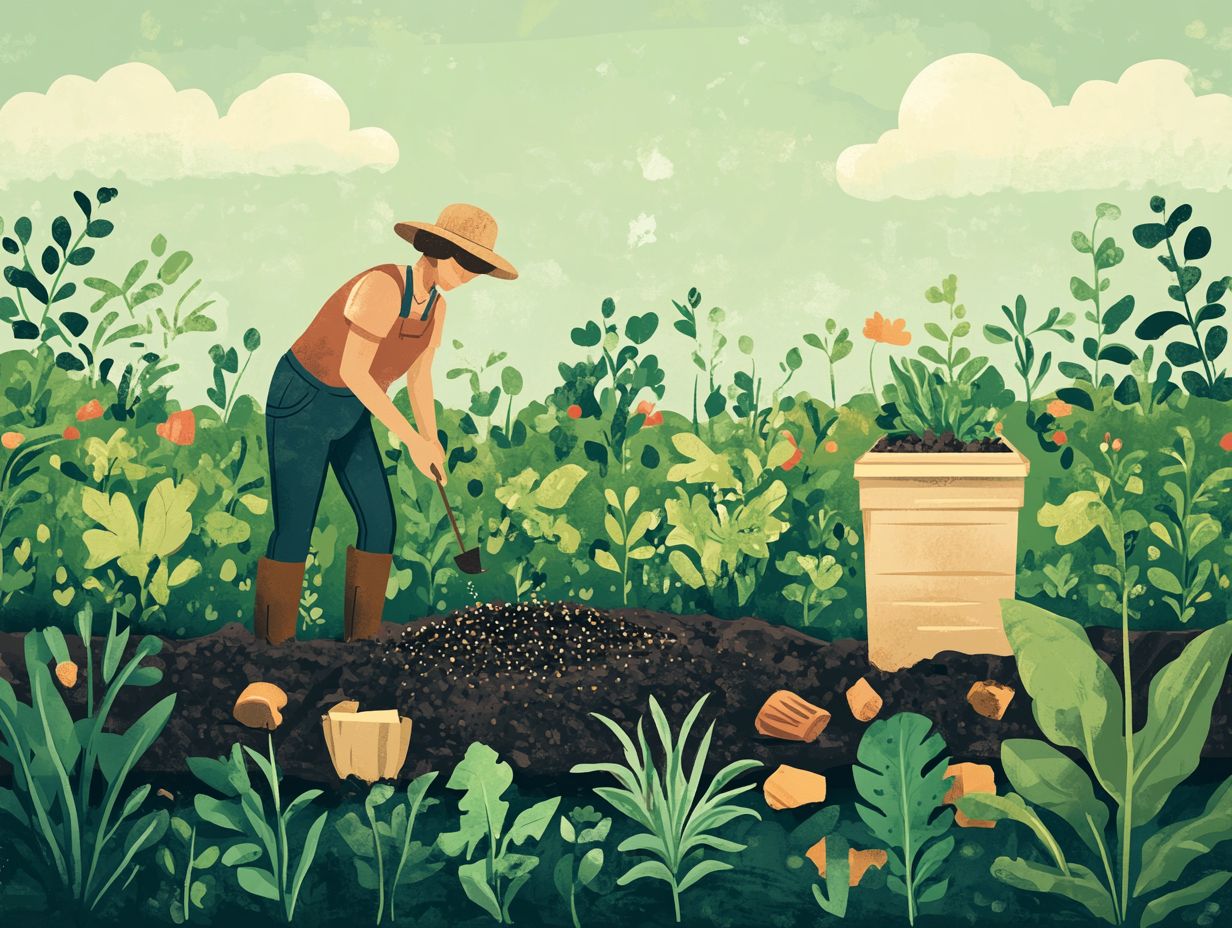
1. What are 5 ways to reduce soil pollution?
- Reduce the use of chemical fertilizers and pesticides
- Practice sustainable farming methods
- Properly dispose of hazardous waste
- Promote composting and organic gardening practices
- Implement strict regulations on industrial waste management
2. How can reducing the use of chemical fertilizers and pesticides help to reduce soil pollution?
Chemical fertilizers and pesticides contain harmful toxins that can seep into the soil and contaminate it. By reducing their use, we can prevent these toxins from entering the soil and causing pollution.
3. What are some sustainable farming methods that can help to reduce soil pollution?
Some sustainable farming methods include crop rotation, intercropping, and using natural fertilizers and pest control methods. These methods help maintain the health and fertility of the soil, reducing the need for harmful chemicals.
4. Why is proper disposal of hazardous waste important in reducing soil pollution?
Hazardous waste, like industrial chemicals and household cleaners, can seriously harm the soil. If not disposed of properly, these wastes can contaminate the soil and lead to significant pollution.
5. How can composting and organic gardening practices contribute to reducing soil pollution?
Composting enriches the soil with nutrients naturally, avoiding chemical fertilizers. Growing plants without chemicals also supports soil health and cuts down on pollution.
6. What role do strict regulations on industrial waste management play in reducing soil pollution?
Strict regulations ensure companies dispose of their waste properly. This action dramatically reduces soil pollution and protects our environment.

